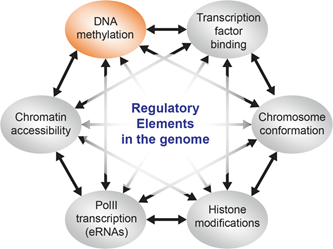Dr Kasper Rasmussen
Principal Investigator
Molecular Cell and Developmental Biology, School of Life Sciences

Contact
Websites
Research
DNA methylation is a chemical modification found on a majority of cytosines in CG dinucleotides in the human genome. This reversible epigenetic mark has been implicated in many important biological processes (e.g. genomic imprinting, X-chromosome inactivation, silencing of transposable elements etc. etc.), however, the role of DNA methylation in regulation of gene expression is still a matter of debate (Schubeler, 2015).
Leukaemias are a group of diseases arising from the blood-forming cells in the body. The gene encoding TET2; an "epigenetic eraser" important for removal of methylation of DNA, is often mutated in blood cancers. However, the downstream molecular events following the occurrence of a mutation are poorly understood. We and others have shown that blood cells lacking TET2 are particularly prone to accumulate DNA methylation at specific regulatory elements in the genome, often defined as enhancers, which are important to control gene expression.
The aim of our work is to dissect the mechanisms by which the proteins regulating the DNA methylation landscape affects chromatin structure and gene expression patterns in hematopoietic cells. To do this, we utilize CRISPR genome editing in embryonic stem cells, mouse and human hematopoietic cell lines and complex mouse models of leukaemia and combine these with the application of new biochemical, genomics and proteomics techniques. The biological insights obtained may provide the basis for developing targeted therapies for blood cancers with mutations in the DNA methylation machinery.
See figure 1 below.

Selected Publications
- Rasmussen KD*1, Berest I*, Kessler S, Nishimura K, Simón-Carrasco L, Vassiliou GS, Pedersen MT, Christensen J, Zaugg JB1, Helin K1 (2018) TET2 binding to enhancers facilitates transcription factor recruitment in hematopoietic cells. bioRxiv 336008; 1Corresponding author view paper
- Rasmussen KD, Helin K (2016) Role of TET enzymes in DNA methylation, development, and cancer . Genes Dev. Apr 1;30(7):733–50. PMID: 27036965 view paper
- Rasmussen KD, Jia G, Johansen JV, Pedersen MT, Rapin N, Bagger FO, Porse BT, Bernard OA, Christensen J, Helin K (2015) Loss of TET2 in hematopoietic cells leads to DNA hypermethylation of active enhancers and induction of leukemogenesis. Genes Dev. May 1;29(9):910–22. PMID: 25886910 view paper
- Wu X, Bekker-Jensen IH, Christensen J, Rasmussen KD, Sidoli S, Qi Y, Kong Y, Wang X, Cui Y, Xiao Z, Xu G, Williams K, Rappsilber J, Sønderby CK, Winther O, Jensen ON, Helin K (2015) Tumor suppressor ASXL1 is essential for the activation of INK4B expression in response to oncogene activity and anti-proliferative signals. Cell Res. Nature Publishing Group; Nov;25(11):1205–18. PMID: 26470845 view paper
- Rasmussen KD, Simmini S, Abreu-Goodger C, Bartonicek N, Di Giacomo M, Bilbao-Cortes D, Horos R, Von Lindern M, Enright AJ, O'Carroll D (2010) The miR-144/451 locus is required for erythroid homeostasis. J Exp Med. Jul 5;207(7):1351–8. PMID: 20513743 view paper
People in my Lab
- Phoebe Crawley
- Amanda Baizan Edge
- Miss Anna Fleming
- Dr Elena Knatko
Media availability
I am available for media commentary on my research.
Investigating the regulation and function of DNA methylation in hematopoiesis
Contact Corporate Communications for media enquiries.
Areas of expertise
- Cancer
Awards
| Award | Year |
|---|---|
| Personal Fellowships / Cancer Research UK Career Development Fellowship | 2019 |
Stories

Press release
A University of Dundee scientist has been awarded £1.4 million from Cancer Research UK to develop research that could bring a ceasefire to cellular warfare taking place within our DNA that can cause blood cancers such as Leukaemia.